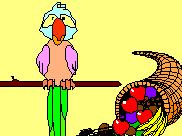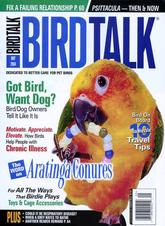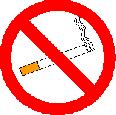NEW 
'Out On A Limb' That Bird Place's New Newsletter Autumn 2004 A brand new page for articles,
links, tips, and general sharing. We will change and add articles as
they come up. Sun Conure featured here is our own sweetie, Frog.... Frog goes to nursing homes the cheer
the residence there! Stories and Articles
Traveling with an avian pet can bring all sorts of experiences. The extreme, of course, would be the story of Togo who traveled with his owner from U.S. to
Canada. You can read that article by clicking on the link in this newsletter.
As a bird enthusiast and breeder, there are times when we find ourselves traveling with hand feeding babies. First of all, you should be aware that there
are laws in each state about the handling and transport of avian pets. What you choose to do about them is up to you
Recently, we traveled from our home in Pennsylvania to my home state of Maine. It was a trip made by myself, my two daughters, our eight month old grandson, three- two week old Sun Conures, a three week old Lovebird, and a gorgeous little Australian Cinnamon Lovebird who was just about fully weaned. We have since then decided to keep him and he has been named Casco in honor of Casco Bay in Maine. We decided to take him/her along because my husband, who was left with the aviary care, is not practiced in hand feeding, and the weaning time can often be the most crucial. As it is, this little fellow is back on three feedings a day.
But as you can imagine this combination of travelers was challenging. My grandson, who is perfect of course, was teething, and again, little Casco, in his own cage decided he was no longer a big bird and reverted back to hand feeding. As for the Sun trio and the other Lovie, we made a travel brooder out of a plastic storage container, {8” X 12”} purchased at Walmart, with a lid that latched securely. We put holes in all sides for ventilation and secured a light bulb fixture inside the lid. We used a red, 25 watt bulb and this kept this smaller brooder quite toasty. At no time did I question whether they were warm enough. It was obvious by handling them that they were plenty warm. We used an outlet converter that plugs in to the cigarette lighter in the car to keep the light going.. You can get them almost anywhere and the one we have puts out 150 watts. This device allows up to a half an hour after the engine is turned off before shutting off. on it’s own This enabled us to go for a quick bite if we did not want to eat in the car.
It was a fairly simple task.
However, my diaper bag for my babies was bigger than the diaper bag my daughter uses for our grandson! I used an overnight bag and packed it with extra formula, extra hand-feeding syringes, extra light bulbs- of various watts, paper towels, tissues, wash cloths for snuggling in, baby blankets to cover the cage. Casco loves his “blanky.” I had seed, Cherios, and dried fruits for this weaning Lovie, and I carried water.
I did not remember, though, that highway rest areas do not have hot water. Reluctantly, I mixed up the hand feeding formula with cold water and only gave them enough to tie them over until the next stop, which would likely be McDonalds and they would have hot water. The chicks were ok with this, but I do not recommend it. Remember to carry hot water in a thermos.
And the fun part is seeing all the peculiar looks you get from family and friends who do not understand avian child rearing. At that age, without feathers and eyes just opening, well.........they aren’t very pretty. But quickly the curious onlookers fall in love with them and are full of questions. “Does she have birds again?” That was the million dollar question. The answer being “Yes,” everyone wanted to see.
With handling, you will of course want people to be careful. Washing hands is a must especially for susceptible little ones. In fact, most people are understanding when you explain why you’d rather they not be handled. For older birds, you will want to make sure wings are clipped, and they may not appreciate handling either. Being away from home can be stressful. So don’t be afraid to say no. It can be a challenge, but taking time to prepare ahead of time with everything you might possibly need, and being ready for any snags along the way will make the trip go smoothly. .......
Update/Togo Is
Home!!! If
you haven't heard about this, it is a must read. Togo is
an African Grey parrot that went to Canada on vacation
with his owner. When they were ready to return back to
U.S.a Canadian Wildlife officer confiscated this prized
pet.There is a happy ending, but this is a cautionary tale. See the story and read
more.Togo The
African Grey Parrot Togo
More Stories!! Free Parrots - Parrots on parade at school and
nursing home Free Parrots - New EU 'will boost illegal
wildlife trade' New York Daily News - Boroughs - Parrots are
talk of the town A
Scary Thought about handling other birds We had visited a local
pet shop several months ago. The owner is someone we have
become friendly with, and she has even sent people to us
for birds that she did not have available in her shop.
Though I do not sell to pet shops, I do consider her a
conscientious shop owner. Her shop and animals are clean
and well kept, and the staff are great folks too. But, things happen.
Normally the owner only buys locally, therefore avoiding
the problem of disease for the most part. She buys out
the nest and hand feeds the bird until it is weaned and
ready for a new owner.
But this time she had a parrot
shipped in from Florida, complete with papers saying he was disease free.
We coo-ed over this baby there
in the shop and held him during that visit several months
ago. Soon
after, we noticed that he was no longer in the shop, and
since we knew he was not done hand feeding, we wondered
where he had gone.......Then months later, he reappeared
in the shop again as a full grown bird and quite
gorgeous! It wasn't until recently
that we heard from a breeder friend that this bird
developed some symptons and upon visiting the vet, it was
found out that he had and infectious and some time fatal
disease. The shop was nearly shut down. He was put on
medication, quarantined, and is fine now. But we handled
him at that time, as I am sure others did as well.
Fortunately we are habitually cautious and wash hands and
change clothes after handling other birds before handling
our own. But the situation could have had devastating
results. So, keep this in mind
when you are handling birds of " unknown
origin." ************************ Read more about African
Greys Parrot
Articles ~ It's A Grey's World Educating on the African
Grey Parrot Natural Remedies for
avian pets The Pet Medicine Chest http://www.avianmedicinechest.com/ Supplies Tony is a
land-lover!
***************** We're
looking for people to write articles, whether it
be one time or regularly. We're looking for
stories, submitted articles, seasonal tips, etc. Contact
us at wwinddancer@hotmail.com |
Try our new classifieds if you are selling, or looking for an avian pet... A New Chat Forum. Ask questions, share your bird family with others, get to know other avian enthusiasts.. Did you meet a new friends who is an avian enthusiast? Would you like to chat with him/her? Try our new chatroom! Cold Weather and Avian Pets. I find that people regain a deeper interest as their focus turns to the indoors. I’m not saying that birds are neglected in the summer months, but most people enjoy more time outside and often in places where their birds can not be. During the winters months when thoughts turn to indoor projects, our birds can enjoy our company more and may even be involved. I know I like having our birds sitting close by when doing craft work or reading.
But there are safety issues with the cold months just as with warm months.
The cold brings draft and you will want to make sure your special friend is not located near a drafty spot or window. Don’t just cover one side of the cage to fend off the chill, move them to a warmer, draft-free area.
Also, you will want to make sure your furnace is top running condition for your own safety as well as your bird. An improperly running furnace can give off odors/fumes that you might not be seriously effected by, but it could kill Polly. Cold weather brings dry weather and birds are susceptible to sinuses ailments too. You may want to run a humidifier and watch for signs of respiratory stress. You will also want to watch those candles and toxic cookware, especially during these months when the house is closed up......... Get those wings trimmed!!! Cockatiels are #1 on the bird brain escape list. They are so aero-dynamic - meaning that they are just build for flight EVEN when wings are trimmed. It takes just a little draft to sweep them up into the trees and out of site. But all birds are an escape risk. Don't fool yourself into thinking that they are not going to go anywhere. Flight is as natural as breathing. Once out of sight, they may want to find their way home, but so many times, lost birds are not reunited with their families. So what do we do??????? Keep wings trimmed. Keep your cage out of direct site of a door. Make sure all screens are secure. Never take your bird outside unless he is in a cage. If you are moving in and out of your door a lot at a certain time, keep your bird secure in his cage. Take the precautions so you don't have to take the loss....... *************** BITING!!! We all have to deal with the bite at some time or another. The fear of it is probably worse than the bite itself, though some bites can be pretty nasty. We assume that birds bite only out of fear, and that may be true most of the time. If you acquire a hand fed baby, you may be surprised when he bites you because he is, after all, a hand fed baby. But keep in mind that a hand fed baby has been taken out of the only home and environment that he knows, and has been taken away from 'Mama.' In this case, if he bites, it is definitely because he is afraid. You can prevent this from happening by careful handling, and taking your queue from the bird as to whether he is ready to go to the next level of interaction. In general, give him his space and let him settle in at his own pace. With older birds going to a new home, this is even more crucial because you have no idea what is going on in their psyche. You are taking on years of conditioning as well as normal fear. But, as I have watched many young fledglings develop, I have noticed that some have an attitude of superiority. A common phrase in my house is, " He has an attitude, " and everyone knows what is meant by this. In fact I have two Maroon Bellied Conure babies still hand feeding as I write, that show this contrast in character. Maroon Bellied Conures are a more docile, gentle, friendly species .......in general.... But the one is laid back and more of a snuggler, while the other is very vocal, and he bites at his sibling, stands on him, and just generally picks on him. He vocalizes at me, when, for some unknown reason, I have offended him, and he has given me the occasional nip. It doesn't hurt, {much}but he clearly wants to be in control and asserts the authority he believes he has. And, he is just six week old and handled no differently that the other. He will need a confident owner that is not intimidated by a few ounces of feathers. This type of bird must have pleasing behavior rewarded and not much fuss made over because parrots thrive on drama. If you squeal, that is enough of a reason to bite again. Note: We have separated these two babies and now that there is no longer any competition, he no longer nips. But he still wants to be boss. I think this is derived from 'the stronger one survives instinct.' Another reason for biting has nothing to do with aggression. We raise Sun Conures and they are the dearest, sweetest things on the face of the earth, in my opinion. But they love to wrestle with mock anger and tussle in play, either with each other, or with people. At times, they get rough and nips happen. It is then time for a time out to get calmed down and that is all it takes, along with a firm, but calm, "Don't bite."Time out - not being intended as punishment, but for a time to gather our composure....again, rewarding good " behavior " with treats or something special. Our Suns, get that look on their faces when they slip and nip as though they know that this is a no-no. Yet another reason for biting is hormons and territory. When it is that time of years, breeding season , most of our parrots turn into Pitbulls. We expect and accept that, and give them their space and handle with caution. The second mentioned being territorial aggression. "Don't touch my cage, my toys , my stuff, my nest box, and sometimes my person!!" It is as simple as that. Some species will be more territorial that others. And then there is that reason {s} that completely elludes us. At times we simply have no idea why they bite. And, what makes them bite one time, will not cause them to bite at an another time. Go figure! The bottom line here is to know your bird and that species. Remember they are not like dogs and cats. We often don't know why birds do the things they do, but a long lasting bond with our avian friends succeeds when we let them be birds and enjoy them for what and who they are... Subscribe to Bird Talk A great source for avian information
uSubscribe.com: Bird Talk Subscription [Magazine] **************** Health
You can drastically effect you bird's health by smoking. Do him a favor and quit. You'll both live longer. Winged Wisdom Pet Bird Magazine - Paramyxovirus - New Castle Disease Breeding Season If you own a female avian pet, you are likely to have to deal with egg laying at some time or another, whether you are breeding or not. The one thing you want to avoid is egg binding. This can be deadly to a bird and the best solution is prevention. Provide your hen with plenty of green veggies, a mineral block, grit, and egg whites and shell. Hard boil the eggs, taking the yoke out, dice up the egg white. Then crush the egg shell with a rolling pin. Give your hen about 2 teaspoons each day. It is a great source of calcium! . |







